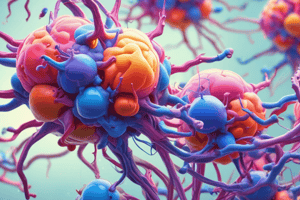Podcast
Questions and Answers
Broccoli is a dopamine-inducing food.
Broccoli is a dopamine-inducing food.
False (B)
The brain's reward system is only activated by sugar consumption.
The brain's reward system is only activated by sugar consumption.
False (B)
Sugar behaves like a drug in the brain, leading to underconsumption.
Sugar behaves like a drug in the brain, leading to underconsumption.
False (B)
Occasional consumption of sugar has addictive effects on the brain.
Occasional consumption of sugar has addictive effects on the brain.
The brain's reward system processes signals from the taste buds and responds with a feeling of pain.
The brain's reward system processes signals from the taste buds and responds with a feeling of pain.
What is the primary function of the brain's reward system?
What is the primary function of the brain's reward system?
What is the effect of sugar on the brain's reward system?
What is the effect of sugar on the brain's reward system?
What is the role of dopamine in the brain's reward system?
What is the role of dopamine in the brain's reward system?
What happens to dopamine levels in response to familiar tastes?
What happens to dopamine levels in response to familiar tastes?
What is the consequence of overconsumption of sugar on the brain?
What is the consequence of overconsumption of sugar on the brain?
Flashcards are hidden until you start studying
Study Notes
Sugar and the Brain
- Sugar is a class of molecules called carbohydrates, found in a wide variety of food and drink.
- Types of sugar include glucose, fructose, sucrose, maltose, lactose, dextrose, starch, high-fructose corn syrup, fruit juice, raw sugar, and honey.
How Sugar Affects the Brain
- When sugar hits the tongue, it activates sweet-taste receptors, sending a signal to the brain stem and then to the forebrain.
- The signal activates the brain's reward system, which is a series of electrical and chemical pathways across several brain regions.
- The reward system processes the signal and responds with a feeling of pleasure or reward.
The Reward System
- The reward system is also activated by socializing, sexual behavior, and drugs.
- Overactivating the reward system can lead to loss of control, craving, and increased tolerance to sugar.
- Dopamine is the major currency of the reward system, and it is released in response to pleasurable activities.
Sugar and Dopamine
- Sugar causes dopamine to be released, though not as intensely as drugs.
- Sugar is rare among dopamine-inducing foods, unlike broccoli which has no effect.
- Dopamine levels spike in response to new or different tastes, and then level off as the food becomes familiar.
Sugar Addiction
- Eating too much sugar can lead to an addictive response in the brain, as it continues to feel rewarding.
- Sugar behaves like a drug in this way, leading to overconsumption.
- Overconsumption of sugar can have addictive effects on the brain, but occasional consumption is not harmful.
Sugar and the Brain
- Sugar is a type of carbohydrate found in various food and drinks, including glucose, fructose, sucrose, and many more.
How Sugar Affects the Brain
- Sugar activates sweet-taste receptors on the tongue, sending signals to the brain stem and forebrain.
- These signals stimulate the brain's reward system, a network of electrical and chemical pathways across multiple brain regions.
- The reward system responds with feelings of pleasure or reward.
The Reward System
- The reward system is also activated by socializing, sexual behavior, and drugs.
- Overstimulation of the reward system can lead to loss of control, cravings, and increased tolerance to sugar.
- Dopamine is the primary neurotransmitter involved in the reward system, released in response to pleasurable activities.
Sugar and Dopamine
- Sugar triggers dopamine release, although less intensely than drugs.
- Sugar is unique among dopamine-inducing foods, unlike broccoli, which has no effect on dopamine levels.
- Dopamine levels spike in response to new or different tastes, then decrease as the food becomes familiar.
Sugar Addiction
- Consuming excessive sugar can lead to an addictive response in the brain, as it continues to feel rewarding.
- Sugar can behave like a drug, leading to overconsumption.
- While occasional sugar consumption is harmless, overconsumption can have addictive effects on the brain.
Sugar and the Brain
- Sugar is a type of carbohydrate found in various food and drinks, including glucose, fructose, sucrose, and many more.
How Sugar Affects the Brain
- Sugar activates sweet-taste receptors on the tongue, sending signals to the brain stem and forebrain.
- These signals stimulate the brain's reward system, a network of electrical and chemical pathways across multiple brain regions.
- The reward system responds with feelings of pleasure or reward.
The Reward System
- The reward system is also activated by socializing, sexual behavior, and drugs.
- Overstimulation of the reward system can lead to loss of control, cravings, and increased tolerance to sugar.
- Dopamine is the primary neurotransmitter involved in the reward system, released in response to pleasurable activities.
Sugar and Dopamine
- Sugar triggers dopamine release, although less intensely than drugs.
- Sugar is unique among dopamine-inducing foods, unlike broccoli, which has no effect on dopamine levels.
- Dopamine levels spike in response to new or different tastes, then decrease as the food becomes familiar.
Sugar Addiction
- Consuming excessive sugar can lead to an addictive response in the brain, as it continues to feel rewarding.
- Sugar can behave like a drug, leading to overconsumption.
- While occasional sugar consumption is harmless, overconsumption can have addictive effects on the brain.
Studying That Suits You
Use AI to generate personalized quizzes and flashcards to suit your learning preferences.




